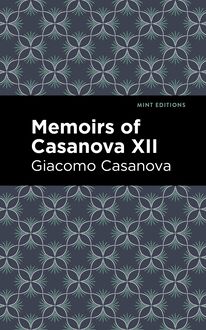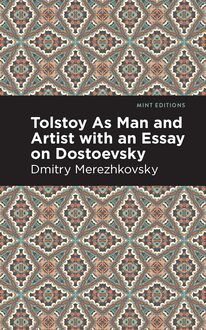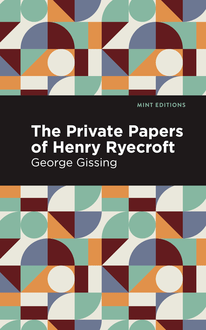-
 Univers
Univers
-
 Ebooks
Ebooks
-
 Livres audio
Livres audio
-
 Presse
Presse
-
 Podcasts
Podcasts
-
 BD
BD
-
 Documents
Documents
-
- Cours
- Révisions
- Ressources pédagogiques
- Sciences de l’éducation
- Manuels scolaires
- Langues
- Travaux de classe
- Annales de BEP
- Etudes supérieures
- Maternelle et primaire
- Fiches de lecture
- Orientation scolaire
- Méthodologie
- Corrigés de devoir
- Annales d’examens et concours
- Annales du bac
- Annales du brevet
- Rapports de stage
La lecture à portée de main
Vous pourrez modifier la taille du texte de cet ouvrage
Découvre YouScribe en t'inscrivant gratuitement
Je m'inscrisDécouvre YouScribe en t'inscrivant gratuitement
Je m'inscrisEn savoir plus
Vous pourrez modifier la taille du texte de cet ouvrage
En savoir plus

Description
Memoirs of Casanova (1792) is the autobiography of Italian adventure and socialite Giacomo Casanova. Written at the end of his life, the Memoirs capture the experiences of one of Europe’s most notorious figures, a man whose escapades as a gambler, womanizer, and socialite are matched only by his unique gift for sharing them with the world. More than perhaps any other man, Casanova sought to emulate the lessons of the Enlightenment on the level of everyday life, a sentiment captured perfectly in the opening sentence of his Memoirs: “I will begin with this confession: whatever I have done in the course of my life, whether it be good or evil, has been done freely; I am a free agent.”Memoirs of Casanova Volume XII finds Giacomo Casanova back in Paris. Using his abundant wit and ability to make connections, Casanova has found success as a spy and diplomat for the French government. At the start of the Seven Years’ War, he is sent on a mission to Holland to procure financial backing for the treasury through the sale of discounted bonds. There, he acquires the largest fortune of his life, making enough to open a silk manufactory. Turning down a title and pension, he manages to squander his earnings through mismanagement, ill-advised investments, and sexual impropriety. Soon, despite his recent success streak, the mercurial Casanova once again finds himself in trouble with the law. With a beautifully designed cover and professionally typeset manuscript, this edition of Giacomo Casanova’s Memoirs of Casanova is a classic of European literature reimagined for modern readers.
Sujets
Informations
| Publié par | Mint Editions |
| Date de parution | 27 avril 2021 |
| Nombre de lectures | 0 |
| EAN13 | 9781513286969 |
| Langue | English |
| Poids de l'ouvrage | 1 Mo |
Informations légales : prix de location à la page 0,0350€. Cette information est donnée uniquement à titre indicatif conformément à la législation en vigueur.
Extrait
Memoirs of Casanova Volume XII
Giacomo Casanova
Memoirs of Casanova Volume XII was first published in 1902.
This edition published by Mint Editions 2021.
ISBN 9781513281940 | E-ISBN 9781513286969
Published by Mint Editions®
minteditionbooks.com
Publishing Director: Jennifer Newens
Design & Production: Rachel Lopez Metzger
Project Manager: Micaela Clark
Translated By: Arthur Machen
Typesetting: Westchester Publishing Services
C ONTENTS I. My Fortune in Holland—My Return to Paris with Young Pompeati II. I Meet with a Flattering Reception from My Patron—Madame D’Urfe’s Infatuation—Madame X. C. V. and her Family—Madame du Rumain III. I Continue My Relations with Mdlle. X. C. V.—Vain Attempts to Procure Abortion—The Aroph—She Flies from Home and Takes Refuge in a Convent IV. Fresh Adventures—J. J. Rousseau—I set up a Business—Castel—Bajac—A Lawsuit is Commenced Against Me—M. de Sartine V. My Examination I Give the Clerk Three Hundred Louis—The Midwife and Cartel-Bajac Imprisoned—Mdlle. X. C. V. is Brought to Bed of a Son and Obliges Her Mother to Make Me Amends—The Suit Against Me is Quashed—Mdlle. X. C. V. Goes with Her Mother to Brussels and from Thence to Venice, Where She Becomes a Great Lady—My Work-girls—Madame Baret—I Am Robbed, Put in Prison, and Set at Liberty Again—I Go to Holland—Helvetius’ “Esprit”—Piccolomini
I
M Y F ORTUNE IN H OLLAND— M Y R ETURN TO P ARIS WITH Y OUNG P OMPEATI
A mongst the letters which were waiting for me was one from the comptroller-general, which advised me that twenty millions in Government securities had been placed in the hands of M. d’Afri, who was not to go beyond a loss of eight per cent.; and another letter from my good patron, M. de Bernis, telling me to do the best I could, and to be assured that the ambassador would be instructed to consent to whatever bargain might be made, provided the rate was not more disadvantageous than that of the exchange at Paris. Boaz, who was astonished at the bargain I had made with my shares, wanted to discount the Government securities for me, and I should very likely have agreed to his terms if he had not required me to give him three months, and the promise that the agreement should hold even in the case of peace being concluded in the meanwhile. It was not long before I saw that I should do well to get back to Amsterdam, but I did not care to break my word to Therese, whom I had promised to meet at the Hague. I received a letter from her while I was at the play, and the servant who brought it told me he was waiting to conduct me to her. I sent my own servant home, and set out on my quest.
My guide made me climb to the fourth floor of a somewhat wretched house, and there I found this strange woman in a small room, attended by her son and daughter. The table stood in the midst of the room, and was covered with a black cloth, and the two candles standing upon it made it look like some sort of sepulchral altar. The Hague was a Court town. I was richly dressed; my elaborate attire made the saddest possible contrast with the gloom of my surroundings. Therese, dressed in black and seated between her children at that black table, reminded me of Medea. To see these two fair young creatures vowed to a lot of misery and disgrace was a sad and touching sight. I took the boy between my arms, and pressing him to my breast called him my son. His mother told him to look upon me as his father from henceforth. The lad recognized me; he remembered, much to my delight, seeing me in the May of 1753, in Venice, at Madame Manzoni’s. He was slight but strong; his limbs were well proportioned, and his features intellectual. He was thirteen years old.
His sister sat perfectly still, apparently waiting for her turn to come. I took her on my knee, and as I embraced her, nature herself seemed to tell me that she was my daughter. She took my kisses in silence, but it was easy to see that she thought herself preferred to her brother, and was charmed with the idea. All her clothing was a slight frock, and I was able to feel every limb and to kiss her pretty little body all over, delighted that so sweet a being owed her existence to me.
“Mamma, dear,” said she, “is not this fine gentleman the same we saw at Amsterdam, and who was taken for my papa because I am like him? But that cannot be, for my papa is dead.”
“So he is, sweetheart; but I may be your dear friend, mayn’t I? Would you like to have me for a friend?”
“Yes, yes!” she cried, and throwing her arms about my neck gave me a thousand kisses, which I returned with delight.
After we had talked and laughed together we sat down at table, and the heroine Therese gave me a delicate supper accompanied by exquisite wines. “I have never given the margrave better fare,” said she, “at those nice little suppers we used to take together.”
Wishing to probe the disposition of her son, whom I had engaged to take away with me, I addressed several remarks to him, and soon discovered that he was of a false and deceitful nature, always on his guard, taking care of what he said, and consequently speaking only from his head and not from his heart. Every word was delivered with a quiet politeness which, no doubt, was intended to please me.
I told him that this sort of thing was all very well on occasion; but that there were times when a man’s happiness depended on his freedom from constraint; then and only then was his amiability, if he had any, displayed. His mother, thinking to praise him, told me that reserve was his chief characteristic, that she had trained him to keep his counsel at all times and places, and that she was thus used to his being reserved with her as with everyone else.
“All I can say is,” said I, “your system is an abominable one. You may have strangled in their infancy all the finer qualities with which nature has endowed your son, and have fairly set him on the way to become a monster instead of an angel. I don’t see how the most devoted father can possibly have any affection for a son who keeps all his emotions under lock and key.”
This outburst, which proceeded from the tenderness I would fain have felt for the boy, seemed to strike his mother dumb.
“Tell me, my dear, if you feel yourself capable of shewing me that confidence which a father has a right to expect of a good son, and if you can promise to be perfectly open and unreserved towards me?”
“I promise that I will die rather than tell you a falsehood.”
“That’s just like him,” said the mother. “I have succeeded in inspiring him with the utmost horror of untruthfulness.”
“That’s all very well, my dear madam, but you might have pursued a still better course, and one which would have been still more conducive to his happiness.”
“What is that?”
“I will tell you. It was necessary to make him detest a lie; you should have rather endeavoured to make him a lover of the truth by displaying it to him in all its native beauty. This is the only way to make him lovable, and love is the sole bestower of happiness in this world.”
“But isn’t it the same thing not to lie and to tell the truth,” said the boy, with a smile which charmed his mother and displeased me.
“Certainly not; there is a great difference—for to avoid lying you have only to hold your tongue; and do you think that comes to the same thing as speaking the truth? You must open your mind to me, my son, and tell me all your thoughts, even if you blush in the recital. I will teach you how to blush, and soon you will have nothing to fear in laying open all your thoughts and deeds. When we know each other a little longer we shall see how we agree together. You must understand that I cannot look upon you as my son until I see cause to love you, and I cannot have you call me father till you treat me as the best friend you have. You may be quite sure that I shall find a way to discover your thoughts, however cleverly you try to hide them. If I find you deceitful and suspicious I shall certainly entertain no regard for you. As soon as I have finished my business at Amsterdam we will set out for Paris. I am leaving the Hague to-morrow, and on my return I hope to find you instructed by your mother in a system of morality more consonant with my views, and more likely to lead to your happiness.”
On glancing at my little daughter, who had been listening to me with the greatest attention, I saw that her eyes were swimming with tears, which she could hardly retain.
“Why are you crying?” said the mother; “it is silly to cry.” And with that the child ran to her mother and threw her arms round her neck.
“Would you like to come to Paris, too?” said I to her.
“Oh, yes! But mamma must come too, as she would die without me.”
“What would you do if I told you to go?” said the mother.
“I would obey you, mamma, but how could I exist away from you?”
Thereupon my little daughter pretended to cry. I say pretended, as it was quite evident that the child did not mean what she said, and I am sure that her mother knew it as well as I.
It was really a melancholy thing to see the effects of a bad education on this young child, to whom nature had given intelligence and feeling. I took the mother on one side, and said that if she ha
-
 Univers
Univers
-
 Ebooks
Ebooks
-
 Livres audio
Livres audio
-
 Presse
Presse
-
 Podcasts
Podcasts
-
 BD
BD
-
 Documents
Documents
-
Jeunesse
-
Littérature
-
Ressources professionnelles
-
Santé et bien-être
-
Savoirs
-
Education
-
Loisirs et hobbies
-
Art, musique et cinéma
-
Actualité et débat de société
-
Jeunesse
-
Littérature
-
Ressources professionnelles
-
Santé et bien-être
-
Savoirs
-
Education
-
Loisirs et hobbies
-
Art, musique et cinéma
-
Actualité et débat de société
-
Actualités
-
Lifestyle
-
Presse jeunesse
-
Presse professionnelle
-
Pratique
-
Presse sportive
-
Presse internationale
-
Culture & Médias
-
Action et Aventures
-
Science-fiction et Fantasy
-
Société
-
Jeunesse
-
Littérature
-
Ressources professionnelles
-
Santé et bien-être
-
Savoirs
-
Education
-
Loisirs et hobbies
-
Art, musique et cinéma
-
Actualité et débat de société
- Cours
- Révisions
- Ressources pédagogiques
- Sciences de l’éducation
- Manuels scolaires
- Langues
- Travaux de classe
- Annales de BEP
- Etudes supérieures
- Maternelle et primaire
- Fiches de lecture
- Orientation scolaire
- Méthodologie
- Corrigés de devoir
- Annales d’examens et concours
- Annales du bac
- Annales du brevet
- Rapports de stage




















